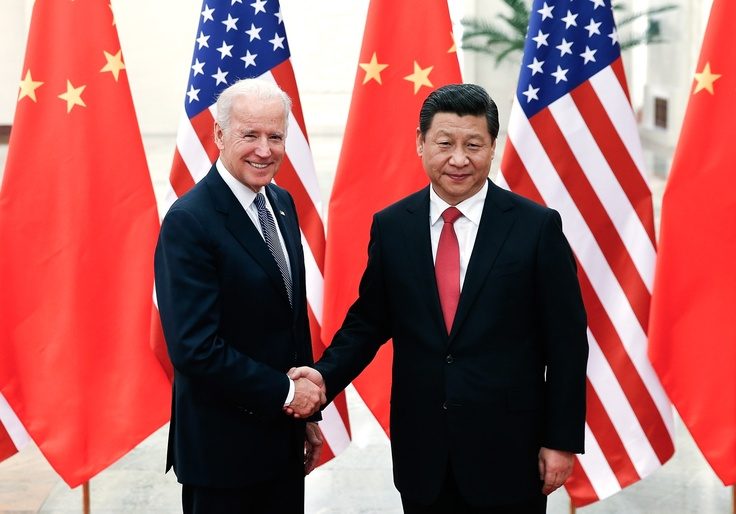In Foreign Policy, Biden Polls Worst on China
89 percent of Americans view Beijing as a 'competitor or enemy'

Among foreign policy issues, Americans express the most distrust for President Joe Biden's ability to deal with China, according to a new Pew Research Center poll.
While 67 percent of respondents believe Biden can improve relations with U.S. allies, just 53 percent signaled confidence in Biden's approach to China. According to the poll, which surveyed larger trends in American public opinion on foreign policy, confidence in Biden's China policy ranks at the bottom among other foreign policy issues, including terrorism and international trade.
Respondents also reported an all-time low favorability rating toward China. Almost 90 percent of those surveyed see China as a "competitor or enemy," and 70 percent support a tougher approach to China's human-rights abuses even if it would harm America's economic relationship with Beijing. "Cold feelings" toward China also increased by 21 percentage points since 2018.
There is a partisan divide, however, in how Americans view their rival in Beijing. While more than 50 percent of Republicans see China as an "enemy," just 20 percent of Democrats hold the same view.
This partisan divide could impact how the Biden administration conducts its China policy. While the Biden administration has retained several Trump administration policies on China, such as the Uighur genocide declaration, Biden has stopped short of some of the Trump administration's more hawkish tactics. In February, Biden revoked a pending Trump executive order that would have mandated increased disclosures between American universities and China-backed Confucius Institutes. Several Biden appointees and nominees in key transition, diplomatic, and defense positions have expressed sympathetic views about China, and in some cases, garnered close ties with China-backed organizations.
Stanford Opens Chinese Studies Center With CCP Ties
University touts extensive cooperation with Chinese organizations deemed security risks

Stanford University rolled out a new center hosting scholars, guests, and programs affiliated with groups backed by the Chinese Communist Party.
The Stanford Center on China's Economy and Institutions opened in February. The center is a subsidiary organization under the umbrella of the Freeman Spogli Institute, a foreign policy consortium with ties to Peking University, a school run by former Chinese spymaster Qiu Shuiping.
The center will host a March 9 event centered on local governance in China featuring Prof. Jean Oi, a founding member of the Stanford research center at Peking University. The Australian Strategic Policy Institute designated Peking University a "high risk" university for its partnerships with military research programs on nuclear technology.
Rachelle Peterson, a senior fellow at the National Association of Scholars, said Stanford's close ties to the Chinese Communist Party are especially concerning as colleges develop relationships with Beijing.
"Higher education has yet to truly grasp the threat of close partnership with the Chinese government," Peterson said. "Confucius Institutes continue to close left and right, but many colleges are simply replacing them with similar centers still funded by China. Stanford not only maintains a Confucius Institute but has just launched another center with alarming attachments."
The new center's rollout marks the culmination of the Silicon Valley university's long-running ties with China. Another university organization, the Stanford Institute for Economic Policy Research, hosts an annual forum focused on Chinese trade and gives platforms to companies and people with ties to the Chinese Communist Party. The 2020 forum welcomed Jia Qingguo, a former dean of Peking University’s international studies program and frequent guest on Chinese state-run television, to discuss U.S.-China relations. In 2019, the forum’s host committee included a cofounder of Baidu, a Chinese tech giant known for its enabling of censorship on behalf of the CCP. In November 2020, Google banned applications developed by Baidu that exposed sensitive data on millions of American mobile devices. The 2019 event was also sponsored by ZhenFund, a venture capital firm invested in Chinese tech companies.
The Freeman Spogli Institute has a history of cooperation with China. After a January Washington Free Beacon report, the institute would not disclose if it had taken money from China. President Joe Biden also nominated one of the institute's senior scholars—former Obama administration official Colin Kahl—for undersecretary of defense. Freeman Spogli Institute fellows also now oversee Stanford's new China center. Stanford also hosts its own Confucius Institute, a China-backed organization described as a forward base for China's espionage and influence operations within the United States.
China-run Confucius Institutes on campus are dwindling but may bounce back after the Biden administration struck down a Trump administration executive order forcing colleges to disclose ties to the organizations. Confucius Institutes are considered foreign missions of the Chinese Communist Party, and national security experts warn they threaten both free expression and American innovation on campus.
Republican lawmakers have made rooting out Chinese influence from college campuses a major plank of their national security agenda. A February report from Sen. Tom Cotton (R., Ark.) proposed increased transparency for American universities and their relationships with China, suggesting a ban on visas for Chinese students hoping to study sensitive technologies. A Cotton aide said the senator's policy proposals are aimed at starting new conversations in Washington about how to confront the China challenge.
"This is a set of policy preferences that he recommends the administration implement, but also a roadmap for how Congress should legislate going forward," the aide said. "It’s important to get these things into the policy space even if it takes years to implement; it’s important to have these conversations now."
The Center on China's Economy and Institutions did not return a request for comment.
No comments:
Post a Comment